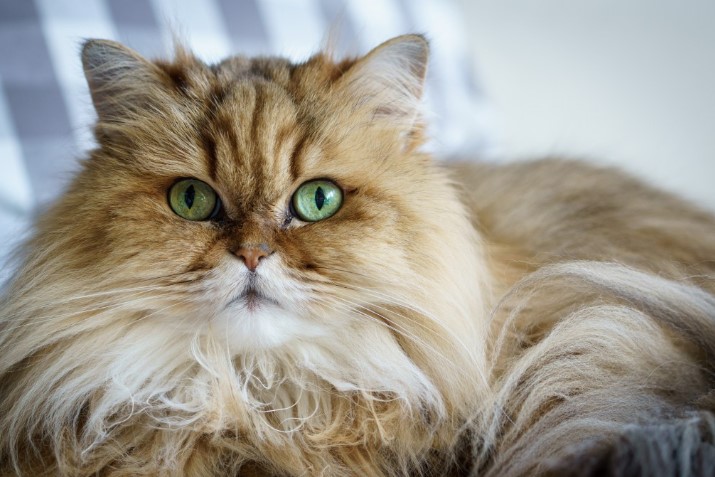Jorts The Cat Wants You To Fight Back
Jorts The Cat has about a quarter million Twitter followers — more than the AFL-CIO. Jennifer Abruzzo of the National Labor Relations Board knows him. Sara Nelson of the Association of Flight Attendants-CWA loves him. Actress Lynda Carter chit-chats with him. He’s on picket signs. He’s in the Wall Street Journal. He’s sometimes (unintentionally) in the trash can, but he is getting better.
Jorts took the internet by storm in December 2021 when a series of reddit posts about two workplace cats — smart tortoiseshell cat Jean and orange himbo Jorts — went viral. Since then, Jorts has delighted Twitter with goofy antics and heartwarming insights, but has also fiercely championed working people, cheering on striking unions and educating workers on their rights.
He might get cups stuck on his head, but Jorts has changed the landscape of labor communications. “Whether you are a veteran organizer or someone that just recently decided to join the labor movement,” says Diana Hussein, communications lead at UNITE HERE. “Jorts’ perspective on workers’ rights and actions is relevant to you.”
I sat down with (well, Twitter DM’d) Jorts in February for an interview. Our conversation has been condensed and edited for clarity.
Aparna Gopalan: What is your origin story in your own words? For those who don’t know you, who is Jorts?
Jorts The Cat: At first I was known as the dumpster cat: I lived outside and did a lot of scrounging from trash. I was friendly (if cautious) with passers-by. Jean would often see me from the window and comment to others indoors. At some point they started to feed me and interact with me. They took me to the vet, got me checked out and vaccinated, then I simply came inside.
There were never any social adjustment issues between Jean and myself, which is unusual! I took to my new environment perfectly.
I was well suited to my new workplace, because Jean and I have different strengths. For example, she has “careful ears” and is more sensitive to sound, while I am the loud sounds guy. She is more likely to sit near someone as a supportive listener while I might stomp on them for snuggles. It works because different people and situations need a different level of care. Sometimes a meeting calls for clowning to ease tension, and other times a more serious and dignified participant is more appropriate.
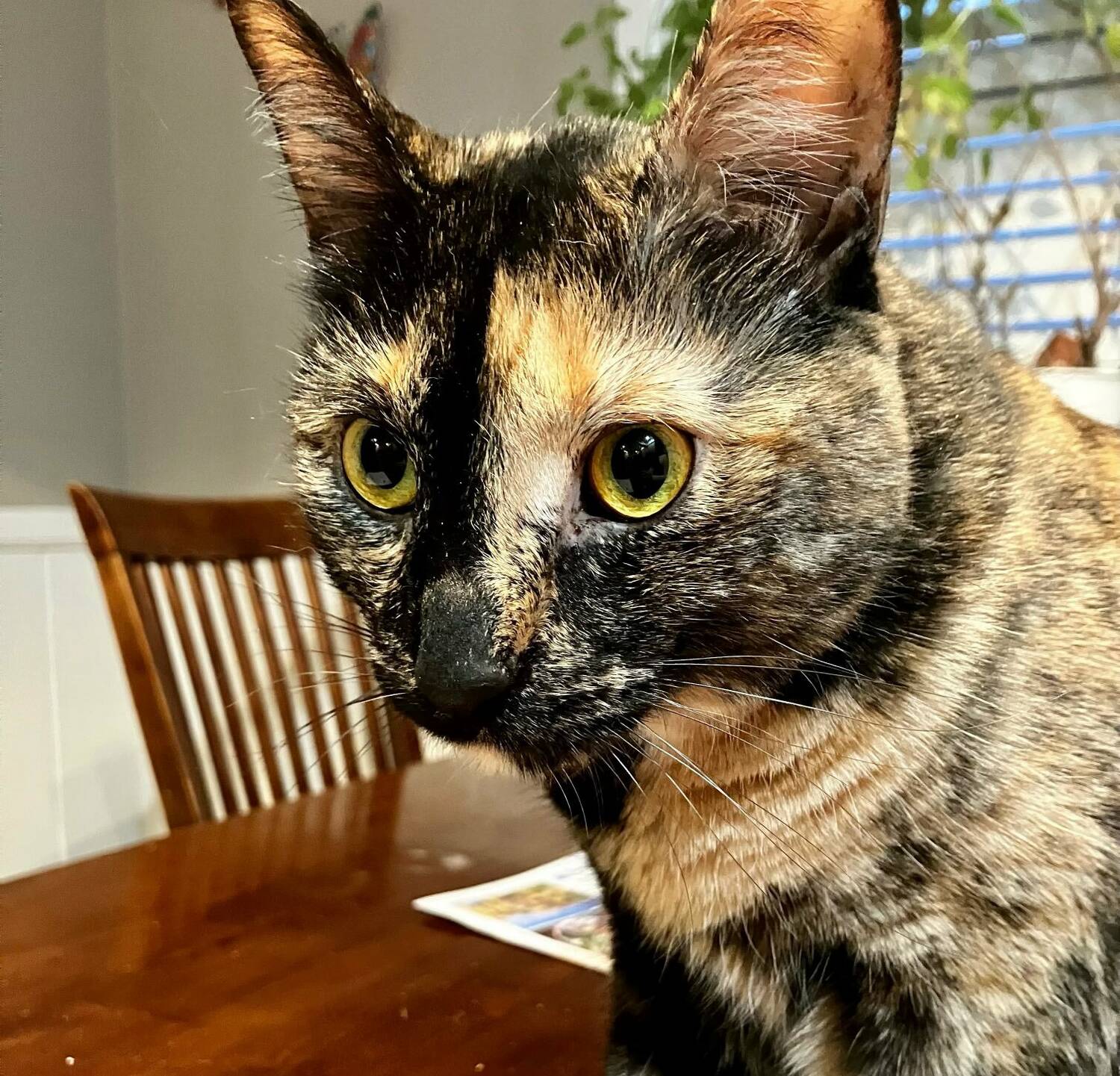
Jorts’ coworker Jean at their workplace. Photo courtesy of Jorts The Cat
I think what people liked about our story is that it is a look at a workplace that centers love and accessibility. If a worker (Jorts) has a disability or just a different strength (stompy snuggler instead of supportive listener), adapting to those needs actually makes the workplace better. This is a silly cat story, but it’s an example that solidarity and accessibility should not seem radical: they’re just common sense.
AG: How did you come to know about, and become a proponent for, the labor movement?
JTC: Jean and I are working cats, so we stand in solidarity with the labor movement.
The lore on how Jean and I became more aware of labor unions specifically involves commercial laundry workers. A delegation of commercial laundry workers once came into our workplace. We learned that commercial or industrial laundries are extremely dangerous places to work: the pay is low and the workers are often in categories that are more likely to face labor exploitation and abuse.
That day, one worker explained how one of her coworkers had lost her arm from being caught in machinery. The boss fired that worker instead of taking any responsibility. The delegation explained they were fighting for their union to reduce preventable accidents and to ensure workers were protected if anything went wrong. They told us customers (like my workplace) could absolutely affect these things by telling the laundry company we supported union efforts or by switching to a union provider, etc.
(They won their union, by the way. Our linens are provided by a union laundry and it is delivered by truck with a Teamster at the wheel.)
Most of the work in this country is being done to make just a very few people rich. But there are more workers than there are bosses, and it’s time we have a fair share of the wealth we build — and a seat at the table when it comes to safety and working conditions. There is a tipping point we need to reach as a society; none of us should be satisfied until all workers have fairness.
AG: We’ve learned a bit about the struggles close to your heart through your tweets. California’s Assembly Bill (AB) 2183 was obviously one. What drew you to become involved in that campaign as its animal mascot?
JTC: It’s really surprising to people — even people who know the basics of labor protections — to learn that farm workers (and domestic workers) have been excluded from the most basic U.S. labor laws since they were first written in the 1930s.
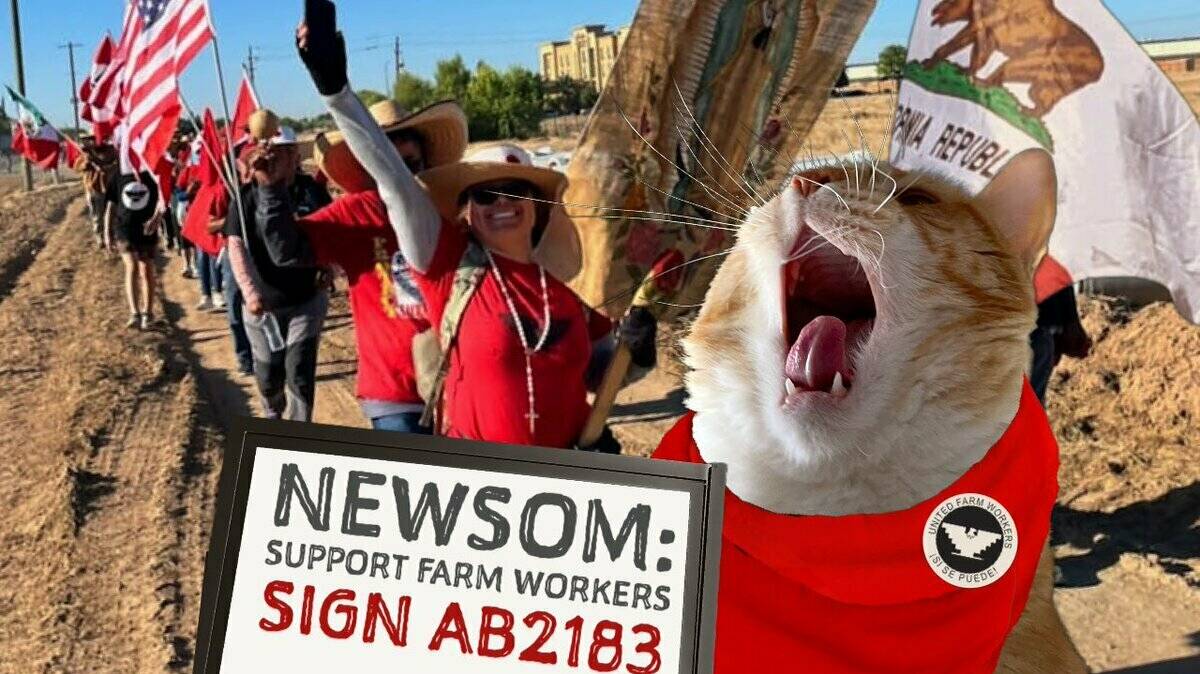
Jorts marching with the United Farm Workers for AB2183. Photo courtesy of Jorts The Cat
Why is that? How can it be that farm workers don’t have the basic rights others take for granted? It’s because Southern congressmen would not extend the protections of the Fair Labor Standards Act and National Labor Relations Act to work they traditionally associated with slavery. These exclusions are the literal living remnant of the Jim Crow era, right out in the open in this country’s fields, orchards and vineyards. How can the labor movement make progress when some of us are stuck in the 1930s?
Farm workers have been fighting for the right to organize for decades, most recently through AB2183 which would make it easier for them to unionize. But even though the law passed in the state senate, Gavin Newsom (governor of California) said he wasn’t going to sign it. Newsom is a vineyard owner. For me, seeing him ignore the needs of the workers who pick the grapes that make the wine that build the wealth that pays for his haircuts was insufferable. He is supposed to be this huge progressive, but he was trying to ignore this archaic problem literally in his backyard.
But workers pushed back. In August 2022, farm workers marched 335 miles from Delano to Sacramento to show their support for AB2183. It was amazing to see their incredible determination and to see the public support grow and grow — with school children and lowrider car clubs and everyday people joining. They took their message all the way to President Biden, who came out in support of AB2183. Eventually, Gov. Newsom backed down and signed the bill because it was simply too embarrassing to ignore the workers anymore. That’s what solidarity is. Make trouble and make noise and just keep holding out for each other until the bosses have to give in.
AG: You’ve made a number of famous Twitter friends ranging from Sara Nelson to Lynda Carter. What does it feel like to be a cat in league with such iconic figures?
JTC: Have you heard the phrase ‘a cat may look at a king’? All cats are pretty immune to fame stuff. It’s just how we operate.
AG: Okay, so what’s the Twitter achievement you’re most proud of?
JTC: This is an example that isn’t an achievement of mine, but an achievement by our whole little corner of the internet: I get a lot of messages from workers who are confused about their rights, and connect them with organizers, advocates and lawyers I have developed friendships with.
One day, a worker reached out to me and told me they had experienced a serious spinal injury at work. I asked my friends for help and we found them a lawyer. They eventually won workers’ compensation, got medical care and ensured the employer was held accountable. Through Union Pete’s fundraisers we all raised money to pay a down payment for a ground floor accessible apartment for them.
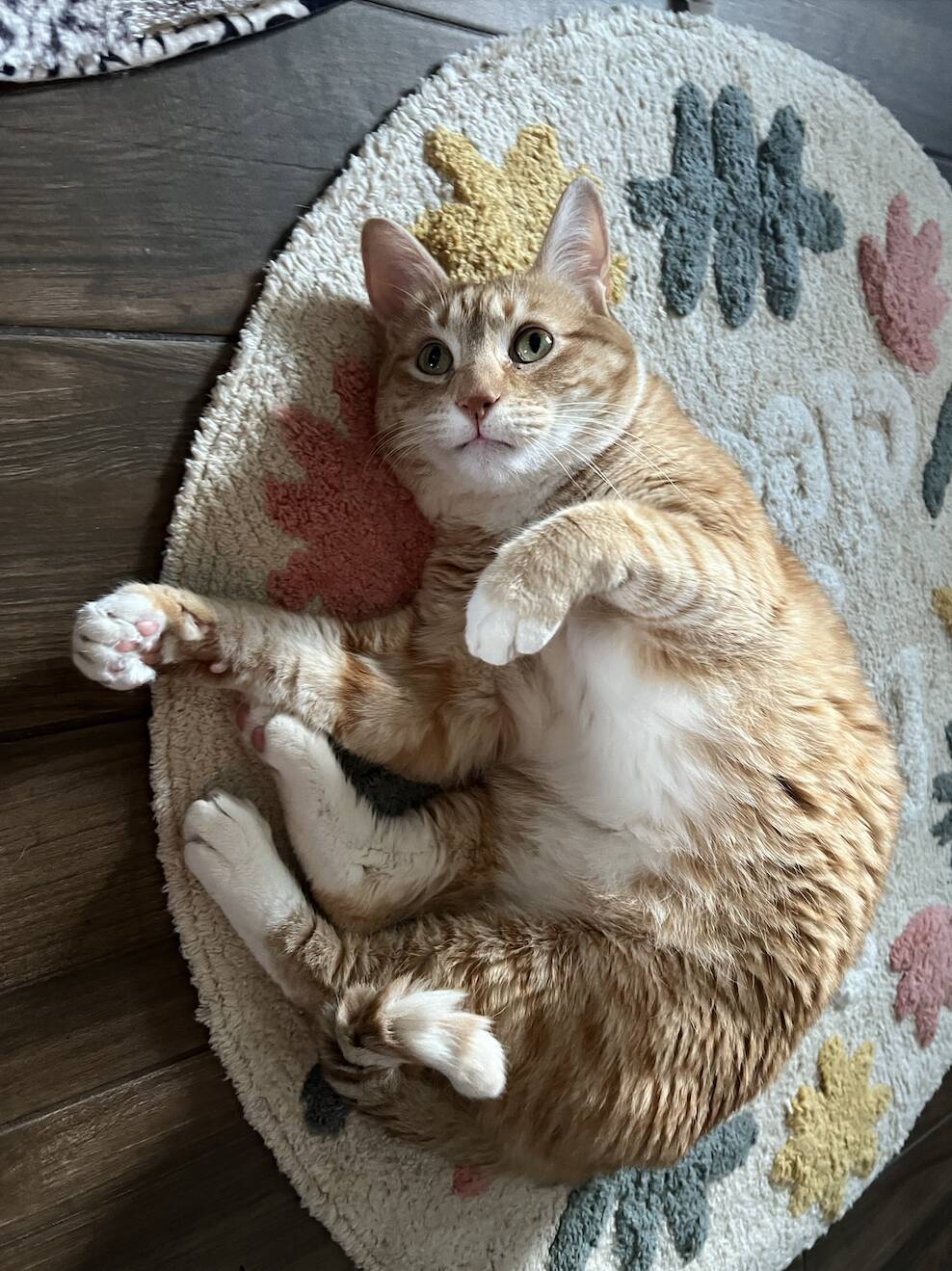
Jorts laying on his new rug after a hard day’s work. Photo courtesy of Jorts The Cat
Seeing a picture of that worker (and their cat) settled into their new home was an incredible feeling. We have to take care of each other to make it possible to keep fighting.
AG: You say “labor justice is disability justice. They cannot be separated if we all want liberation.” You’ve said similar things about how labor justice is incomplete without racial justice, LGBTQ justice, etc. What do you mean?
JTC: I get very frustrated with people who try to pit the labor movement against disability justice. A large portion of workers are disabled, and disabled people are also often the ones providing unpaid care for others. Protecting disabled workers from inequity is one of the most important parts of labor justice.
More broadly, justice simply is not justice until it includes everyone. When I say All Cats Are Beautiful, I mean ALL cats. The very concept of cats is beautiful, every single cat but also the very way we think about cats.
Let me be clear about one thing: cop unions do not count, because cops are not workers. They are here to break our strikes, protect private wealth and exert their unchecked and deadly will against the rest of us.
AG: You’re often accused of having someone, eg. a human, “behind” your account. I want to give you space to address that allegation. Who writes your tweets/how are they written?
JTC: I am a cat. I type my own tweets with my toe beans. I use the mobile app as it is more paw-friendly.
AG: In your year of public activism, you’ve been a source of information for many, especially around workers’ rights. Why is this important to you?
JTC: Especially in the United States, many workers do not know their basic rights. For example, we have a legally protected right to talk about our wages, yet forbidding that is a widespread ‘policy’ in many workplaces. In truth, it is against the law to retaliate against workers for talking about their wages.
Everyone needs to talk about their wages, because so often there are big discrepancies for no real reason. These gaps are especially large comparing white men to any other demographic. (If you’re a white man, you especially should talk about your wages.)
Not enough people are communicating really simply about this stuff.
-
How do you form a union? There are four steps, one for each of my paws.
-
If you can talk about cats, you can talk about your paycheck.
-
It’s against the law for management to take your tips.
-
Making you come in early, stay late or work off the clock is wage theft.
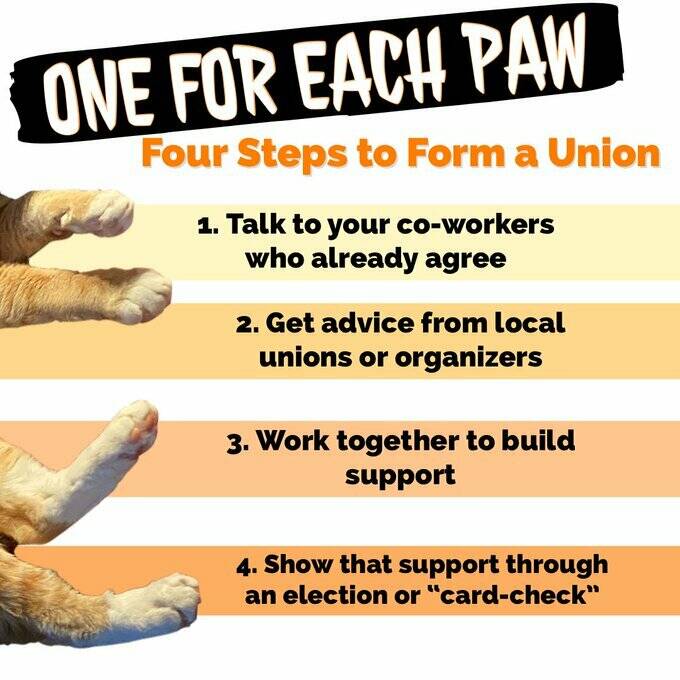
Jorts’ graphic on how to unionize in four steps, one for each paw. Photo courtesy of Jorts The Cat
These are simple concepts. We need to get back to basics to ensure workers know their rights so it’s harder for bosses to cheat us and steal from us.
AG: You say “the softest paw can be a claw.” What does this mean? Is this about the role of love in the labor movement?
JTC: That phrase is from a song Jean likes. I think you can interpret it in two mirrored ways. The softest little kitty, the newest hired worker, the quietest kid in class, anyone at all could actually give a boss a big scratch if they aren’t wary. You never know who will fight back if you don’t respect people’s rights.
It can also mean the softest and most caring thing you can do is to fight back. Solidarity with your peers is an act of radical love. Fighting to make a job better, and especially forming a union, is an act of love to yourself, your coworkers and to workers you’ve not even met who might be hired in the future.
AG: How many days has it been since you had a trash-can incident or a being-locked-in-a-closet incident? How are your coworkers supporting you as you try not to have more of those?
JTC: As of this writing, it has been two months since my latest mishap. These mishaps have gotten farther and farther apart, thanks to my adaptive and accessible workplace working diligently to put safety measures in place that keep me from swimming in the garbage all the time.
AG: What are the labor struggles you’re watching most closely right now?
JTC: I am excited to watch more states address farm worker overtime equity. I am watching how California fast food workers are still fighting back against the restaurant bosses’ attempt to buy their way out of democracy.
We’re all watching the UPS Teamsters contract countdown. Graduate student worker organizing is roaring to life right now, and that’s so exciting to see. The wave of Starbucks organizing has been so inspiring, but our movement and our country still needs to grapple with how to actually turn those wins into a contract and how to defeat wealthy bosses’ attempts to drag things out until the workers are exhausted. The laws are there: we need those laws to work. I want to see legislators like Jean’s guy (Bernie Sanders) work together to hold Starbucks and Amazon accountable for how they skirt the law.
Policies are great, but nothing protects an individual worker like forming their union and negotiating a collective agreement. I want every strip club and Medieval Times and donut shop to have people asking questions, forming a committee and organizing to win their union.
AG: If these people were reading this article, what would be your one line message to them: a) Joe President, b) Labor mom Jennifer Abruzzo, c) workers facing union busting, d) Howard Schultz or any of his co-CEOs?
JTC:
a) C’mon man
b) Get ‘em
c) If we fight together, we win. There are more of us than there are of them, and they can’t do anything without us. Solidarity is worth the struggle. You wouldn’t let your neighbor disrespect you — don’t let your boss disrespect you either.
d) I hope you pay lawyers a lot of money to look at this [picture of my butt]


